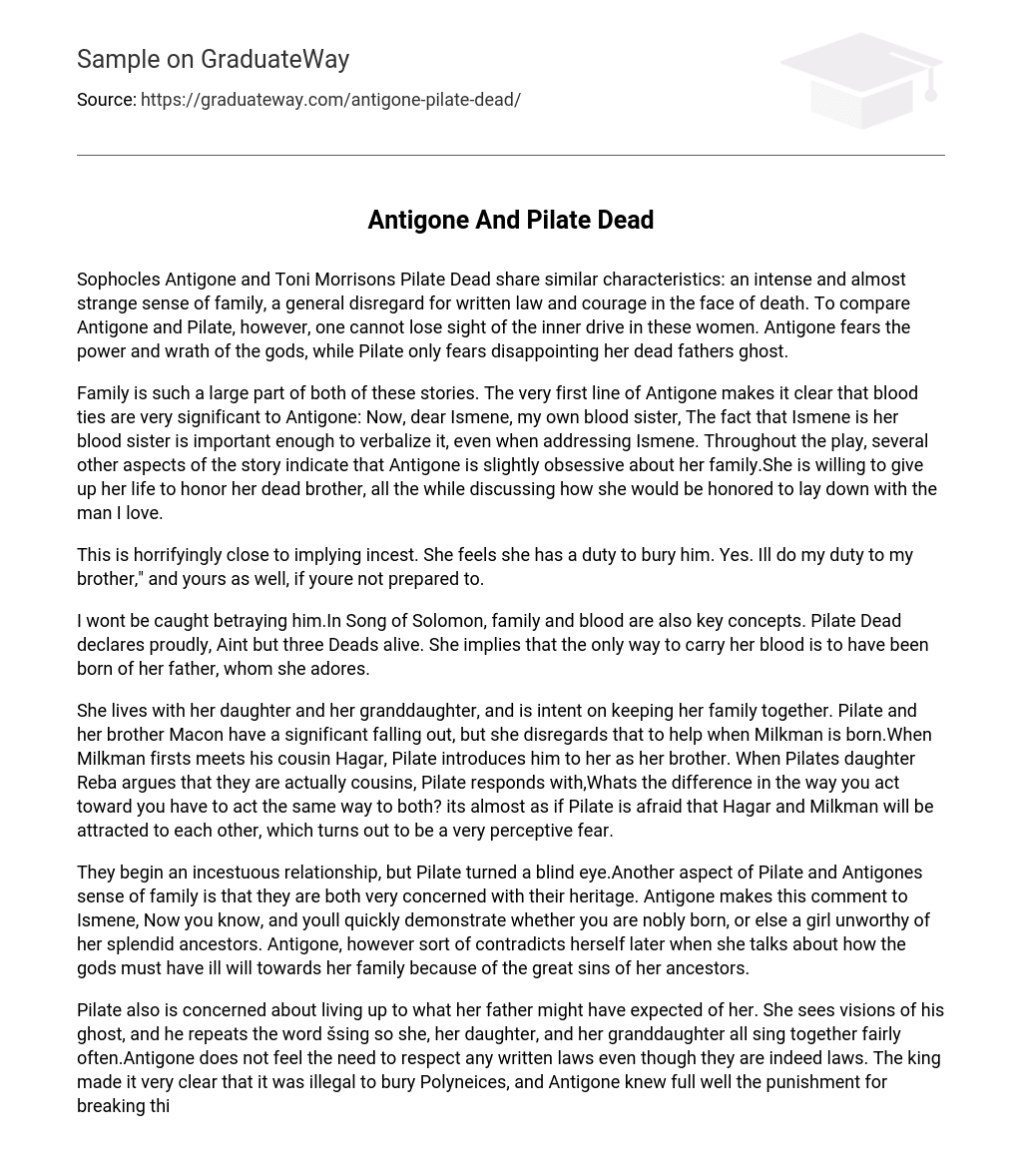Sophocles’ Antigone and Toni Morrison’s Pilate Dead both exhibit similar qualities. These include an intense and almost peculiar sense of family, a general disregard for written law, and bravery in the face of death. However, comparing Antigone and Pilate requires recognizing the inner motivations that drive these women. Antigone’s fear stems from the power and anger of the gods, whereas Pilate’s only fear is disappointing her deceased father’s spirit.
Family plays a major role in both of these stories. Antigone emphasizes the importance of blood ties right from the start: “Now, dear Ismene, my own blood sister.” Antigone explicitly acknowledges her sister’s familial connection. As the play progresses, it becomes evident that Antigone is somewhat fixated on her family. She is willing to sacrifice her life to honor her deceased brother and even discusses how she would gladly be buried alongside her beloved.
This statement is alarmingly similar to insinuating incest. She believes it is her responsibility to bury him. “Yes. I will fulfill my responsibility to my brother,” and also to yours, if you are not ready.
I will never betray him. In the novel Song of Solomon, the themes of family and blood are also significant. Pilate Dead expresses her pride by saying, “There are only three Deads alive.” She suggests that the only way to have her blood is to be born from her beloved father.
She resides with her daughter and granddaughter, determined to maintain the unity of her family. Even though Pilate and her brother Macon have a major falling out, she puts aside their conflict to assist when Milkman is born. During Milkman’s first encounter with his cousin Hagar, Pilate introduces her as his sibling. When Pilate’s daughter Reba argues that they are actually cousins, Pilate responds by asking, “What’s the difference in the way you act towards family? You have to treat them the same way.” It seems as though Pilate is apprehensive about the potential attraction between Hagar and Milkman, a fear that ultimately proves to be astute.
They initiate an incestuous relationship, but Pilate ignores it. Another aspect of Pilate and Antigone’s familial bond is their shared concern for their lineage. Antigone tells Ismene, “Now you know, and you’ll quickly prove whether you are of noble birth or simply unworthy of our illustrious ancestors.” However, Antigone somewhat contradicts herself later by discussing how the gods must hold resentment towards her family due to the grave transgressions committed by their predecessors.
Pilate shares the same concerns as her father and wants to meet his expectations. She frequently sees visions of her father’s ghost, who encourages her, her daughter, and her granddaughter to sing together. On the other hand, Antigone disregards written laws, including the prohibition on burying Polyneices, despite being fully aware of the severe consequences set by the king for breaking this rule.
Despite knowing that carrying out her actions would result in her execution, she remained firm in her belief that divine law held greater significance. Similarly, Pilate frequently acts according to her own whims and fancies. Notably, she pursues a livelihood of producing and marketing wine.
Her brother expresses dissatisfaction with her actions, claiming that she engages in the sale of products to both underage individuals and those who are criminally insane. She demonstrates a willingness to sell to anyone who is willing to purchase. Pilate displays a consistent lack of concern for abiding by the law, even resorting to deception with law enforcement in order to secure the release of Milkman and his companion from incarceration.
Both Pilate and Antigone have different reactions to the concept of death. Antigone views it as a privilege as she is willing to die for what she believes is right, showing almost excitement about being killed. She even boasts about it and mocks her sister for not sharing the same willingness to participate.
But you chose life – it was my choice to die. When her brother passes away, it appears that she is more distraught over the fact that he is not receiving a proper burial than his actual death. When Pilates’ granddaughter dies, she performs a song at the funeral. Despite being visibly shaken, she adopts an almost commanding demeanor and proceeds to sing and shout during the ceremony.
She stares almost accusingly at the people in the pews, repeating “my baby girl” and then screaming out “and she was loved!” At the end of the book, Pilate is shot in the neck by a stray bullet. As she lies dying, she only asks Milkman to sing something for her. With all of these similarities, one major difference separates Antigone and Pilate while also tying their respective similar characteristics together. Antigone and Pilate have significantly different motives and drives behind their actions and characteristics. Antigone’s character development stems from a desire to please the gods.





